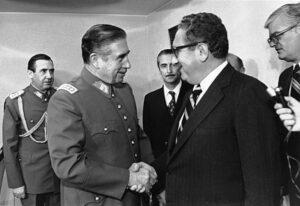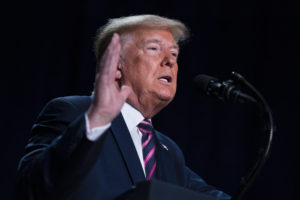Official Washington Has Turned Michael Flynn Into Road Kill
The former national security adviser’s case is a disturbing example of how politicized law enforcement can destroy a U.S. citizen’s life in today’s new McCarthyism. Retired Lt. Gen. Michael Flynn, the former director of the Defense Intelligence Agency, testifies before a congressional hearing in Washington, D.C., in 2014. (Staff Sgt. Jonathan Lovelady / DIA)
Retired Lt. Gen. Michael Flynn, the former director of the Defense Intelligence Agency, testifies before a congressional hearing in Washington, D.C., in 2014. (Staff Sgt. Jonathan Lovelady / DIA)
By Robert Parry / Consortiumnews
Retired Lt. Gen. Michael Flynn, the former director of the Defense Intelligence Agency, testifies before a congressional hearing in Washington, D.C., in 2014. (Staff Sgt. Jonathan Lovelady / DIA)
Not to defend retired Lt. Gen. Michael Flynn for his suspect judgment, but it should be noted that his case represents a disturbing example of how electronic surveillance and politicized law enforcement can destroy an American citizen’s life in today’s New McCarthyism.
The testimony on Monday by former acting Attorney General Sally Yates and former Director of National Intelligence James Clapper offered no evidence of Flynn’s wrongdoing – those facts were deemed “classified” – yet the pair thoroughly destroyed Flynn’s reputation, portraying him as both a liar and a potential traitor.
That Senate Democrats, in particular, saw nothing troubling about this smearing of the former director of the Defense Intelligence Agency and, briefly, President Trump’s national security adviser was itself troubling. Republicans were a bit more skeptical but no one, it seemed, wanted to be labeled as soft on Russia.
So, there was no skepticism toward Yates’s curious assertion that Flynn’s supposed lying to Vice President Mike Pence about the details of a phone call with Russian Ambassador Sergey Kislyak somehow opened Flynn to Russian blackmail – her core explanation for why she rushed to Trump’s White House with warnings of this allegedly grave danger.
Yates also talked ominously about “underlying” information that raised further questions about Flynn’s patriotism, but that evidence, too, couldn’t be shared with the American people; it was classified, leaving it to your imagination the depth of Flynn’s perfidy.
Despite the thinness of Yates’s charges – and the echoes of Sen. Joe McCarthy with his secret lists of communists that he wouldn’t release – the mainstream U.S. news media has bestowed on Yates a hero status without any concern that she might be exaggerating the highly unlikely possibility that the Russians would have blackmailed Flynn.
Her supposition was that since Vice President Mike Pence’s account of the Kislyak-Flynn conversation deviated somewhat from the details of what was actually said, the Russians would seize on the discrepancy to coerce Flynn to do their bidding.
But that really makes no sense, in part, because even if the Russians did pick up the discrepancy, they would assume correctly that U.S. intelligence had its own transcript of the conversation, so there would be no basis for blackmail.
Yates’s supposed alarm might make for a good spy novel but it has little or no basis in the real world. But it is hard for Americans to assess her claims because all the key facts are classified.
Ignorance Is Strength
The public does not even know what was said between Kislyak and Flynn on Dec. 29, 2016, when Kislyak called Flynn, who was on vacation in the Dominican Republic. The two apparently discussed the worsening U.S.-Russian relations, since President Obama had just imposed new sanctions on Russia, but it’s unclear how specific the references to the sanctions were.
The details are important here, as is the fact that Flynn might well have failed to recall all the details because he was not at his office and did not have staff support for note-taking or recording. For all we know, Flynn was in his bathing suit, Pina Colada in hand.
So, the assumption that Flynn was intentionally lying when he later briefed Pence and other colleagues is a stretch. Yet he is being convicted in the court of public opinion without the evidence being presented or without him getting a serious chance to defend himself.
Yates’s own motives might also deserve examination. Her behavior has the look of a partisan prosecutor who likely would have been in line for a top job under President Hillary Clinton. Would that influence her eagerness to twist facts to destroy Flynn and hurt Flynn’s boss?
After all, the mood inside the Obama administration in its final days was one of doing whatever it could to strengthen the “resistance” to the incoming Trump administration. After the Inauguration, there were massive anti-Trump protests with calls for Obama holdovers to join the #Resistance. Yates, as an Obama holdover and acting Attorney General, was in a perfect position to “resist.”
While the anti-Trump sentiment was understandable in a political sense, it created a motive for Yates to exaggerate an alleged threat and thus initiate an immediate crisis inside the Trump administration, a goal that she accomplished.
There was also a payback factor against Flynn who had infamously joined in the Republican National Convention’s chant of “lock her up.” Thus, Clinton partisans had a strong motive to create the circumstances to lock Flynn up, which now seems quite possible.
Rush to Judgment
Yet, amid this rush to judgment on Russiagate, the American public hasn’t had a chance to hear from Flynn or the other Trump advisers who have been portrayed as Russian agents based on innuendo, including the contents of an opposition research dossier compiled by a former British intelligence officer and apparently funded by unknown Clinton supporters.
Taking another step backward, we don’t even know the evidence behind the allegations of Russian interference in the 2016 campaign. To back up those charges, President Obama’s intelligence chiefs issued a sketchy report on Jan. 6, 2017, that offered no evidence – only assertions – about Russian operatives hacking into Democratic email accounts and then somehow slipping the information to WikiLeaks.
The Russian government and WikiLeaks both deny that scenario, and the Jan. 6 report does little more than repeat over and over how confident its writers are that Russia is guilty.
On Monday, former DNI Clapper did clarify one point that Democrats have consistently misstated: that the report was not the consensus judgment of the 17 U.S. intelligence agencies, but rather was the work of just three of the agencies: Central Intelligence Agency, National Security Agency and Federal Bureau of Investigation.
But the bigger problem with the Jan. 6 report is that it was entirely one-sided, citing reasons to believe the Russians were guilty but ignoring equally strong reasons to doubt the Russians’ guilt.For instance, the report focused on Russia’s presumed motive for “hacking” and distributing emails harmful to Hillary Clinton’s campaign, citing Russian President Vladimir Putin’s concern that Clinton would be a threat to worsen the already frayed relationship between the two nuclear superpowers.
But the report ignores the downside for Russia trying to interfere with the U.S. election campaign and then failing to stop Clinton, which looked like the most likely outcome until Election Night.
If Russia had accessed Democratic emails and slipped them to WikiLeaks for publication, Putin would have to think that the National Security Agency, with its exceptional ability to track electronic communications around the world, might well have detected the maneuver and would have informed Clinton.
So, on top of Clinton’s well-known hawkishness, Putin would have risked handing the expected incoming U.S. president a personal reason to take revenge on him and his country. Historically, Russia has been very circumspect in such situations, usually holding its intelligence collections for internal purposes only, not sharing them with the public.
While it is conceivable that Putin decided to take this extraordinary risk in this case – despite the widely held view that Clinton was a shoo-in to defeat Trump – an objective DNI report would have examined this counter argument for him not doing so.
But the DNI report was not driven by a desire to be evenhanded; it was, in effect, a prosecutor’s brief, albeit one that lacked any real evidence that the accused is guilty.
The DNI report also included a seven-page appendix, dating from 2012, that is an argumentative attack on RT, the Russian government-backed television network, which is accused of portraying “the US electoral process as undemocratic.”
The proof for that accusation includes RT’s articles on “voting machine vulnerabilities” although virtually every major U.S. news organization has run similar stories, including some during the last campaign on the feasibility of Russia hacking into the actual voting process, something that even U.S. intelligence says didn’t happen.
The report adds that further undermining Americans’ faith in the U.S. democratic process, “RT broadcast, hosted and advertised third-party candidate debates.” Apparently, the DNI’s point is that showing Americans that there are choices beyond the two major parties is somehow seditious.
“The RT hosts asserted that the US two-party system does not represent the views of at least one-third of the population and is a ‘sham,’” the report said. Yet, polls have shown exactly that sentiment, that large numbers of Americans would prefer more choices than the usual two candidates and, indeed, most Western democracies have multiple parties,
So, RT’s implicit criticism of the U.S. political process is certainly not out of the ordinary. It is extraordinary, however, that the U.S. intelligence community would consider that by allowing American third-party nominees to express their opinions, RT was somehow subverting the American democratic process.
The report also takes RT to task for covering the Occupy Wall Street movement and for reporting on the environmental dangers from “fracking,” topics cited as further proof that the Russian government was using RT to weaken U.S. public support for Washington’s policies (although, again, these are topics of genuine public interest).
Given the weakness – indeed the absurdity – of these attacks on RT, Americans might have reason to wonder how strong the evidence is regarding the 2016 election, too. But we are not allowed to see that evidence at all. It’s classified.
As for Michael Flynn, there may well be legitimate criticism of him for agreeing to give a paid speech at RT’s tenth anniversary in 2015, apparently without clearing it with the Pentagon.
I’m also told that Flynn made friends with some Russian military officers whom he met amid Russia’s cooperation with the U.S. military campaigns in Afghanistan and in the fight against terrorism.
Of course, President Obama himself developed a cooperative relationship with President Putin and his predecessor Dmitri Medvedev. Putin played a key role in persuading Iran to accept tight constraints on its nuclear program, an agreement that Obama considered his greatest foreign policy achievement.
It was only after the U.S.-orchestrated putsch in Ukraine in early 2014 and Russia’s reaction to a new hostile regime on its borders that the U.S.-Russia relationship became clearly antagonistic. Though most U.S. politicians and the media solely blame Putin and Russia, an objective assessment would put blame on the U.S. side as well.
But objectivity is in very short supply in today’s Washington, especially since the embittered Democrats saw in Trump’s hopes for restoring a more cooperative relationship with Russia a political vulnerability that could be exploited with the prospect that the scandal could be expanded into possible impeachment.
In Official Washington’s view, Michael Flynn becomes just road kill in the larger competition for power.
Investigative reporter Robert Parry broke many of the Iran-Contra stories for The Associated Press and Newsweek in the 1980s. You can buy his latest book, “America’s Stolen Narrative,” either in print here or as an e-book (from Amazon and barnesandnoble.com).
Your support matters…Independent journalism is under threat and overshadowed by heavily funded mainstream media.
You can help level the playing field. Become a member.
Your tax-deductible contribution keeps us digging beneath the headlines to give you thought-provoking, investigative reporting and analysis that unearths what's really happening- without compromise.
Give today to support our courageous, independent journalists.






You need to be a supporter to comment.
There are currently no responses to this article.
Be the first to respond.